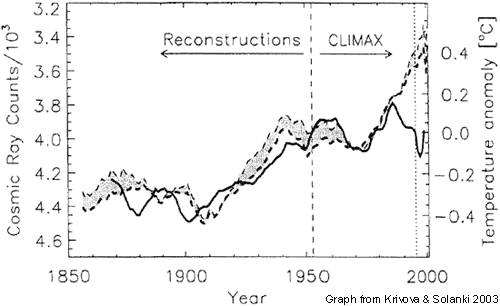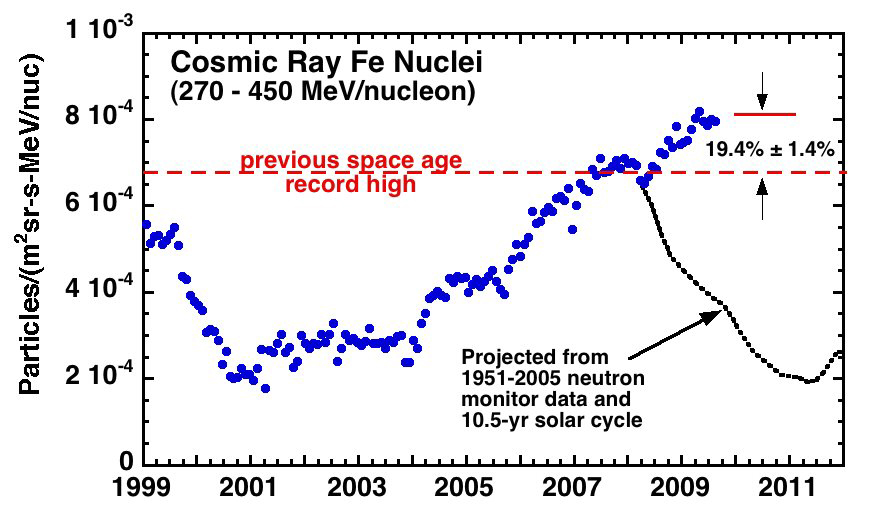
Figure 1: Reconstructed cosmic radiation (solid line before 1952) and directly observed cosmic radiation (solid line after 1952) compared to global temperature (dotted line). All curves have been smoothed by an 11 year running mean (Krivova 2003).
A few months ago, the Canadian Committee for the Advancement of Scientific Skepticism (CASS) issued a report regarding a slew of climate misinformation being taught at Carleton University in Ottawa, Canada by Tom Harris. Somehow Harris, who is an engineer and communications specialist with zero climate research experience, and is the Executive Director of the Heartland Institute-funded International Climate Science Coalition, was put in the position to teach a class on climate and Earth science at Carleton University. More recently, Harris has taken to denouncing what he terms "climatism," which appears to be a disparaging synonym for "climate science." How an anti-climate science engineer was made lecturer of a climate science class at Carleton University is something of a mystery, and a poor decision by the university.
The CASS report followed the growing trend of climate misinformation debunkings using the Skeptical Science database. In this post we will examine just a few of the myths identified by CASS as regrettably being used by Harris to misinform Carleton University students.
A popular climate myth, coming in at #21 on the list of most used climate myths, is that global warming is being caused by galactic cosmic rays. The reason this myth is so popular is that it's a relatively new hypothesis, and thus has only been investigated by climate researchers in recent years. However, the vast majority of studies on the subject have found little if any relationship between galactic cosmic rays and global temperatures.
That didn't stop Harris from exhibiting one of the 5 characteristics of scientific denialism to claim otherwise in his lectures - cherrypicking. As John Cook wrote two years ago in describing this denialism characteristic,
"[cherrypicking] involves selectively drawing on isolated papers that challenge the consensus to the neglect of the broader body of research..."
This is precisely how Harris taught his class, picking out the few scientific studies which seemed to indicate a relationship between cosmic rays and global temperatures, and completely neglecting to mention the vast majority of studies finding little to no correlation between the two. More importantly, galactic cosmic ray flux on Earth has been flat on average over the past six decades, and therefore could not be responsible for a long-term global warming trend over that period. As Figure 1 shows, starting around 1925, the cosmic ray increase lagged behind the temperature increase, and temperatures continued to rise after 1970 while cosmic ray flux did not.

Figure 1: Reconstructed cosmic radiation (solid line before 1952) and directly observed cosmic radiation (solid line after 1952) compared to global temperature (dotted line). All curves have been smoothed by an 11 year running mean (Krivova 2003).
Additionally, there was a record high cosmic ray flux observed in 2009 (Figure 2). The hypothesis espoused by Harris claims that cosmic rays are supposed to cause cooling by increasing cloud cover, yet 2009 was one of the hottest years on record.

Figure 2: Record cosmic ray flux observed in 2009 by the Advanced Composition Explorer (NASA)
Harris chose simply not to teach these inconvenient facts to his students, instead only presenting the cherrypicked bits of information which seemed to support the case he wanted to present them.
Along similar lines as his cosmic ray cherrypick, Harris decided to toss physics aside and claim that human effects on the climate are too small to measure.
"Until we understand natural cycles of climate without humans, it’s very very tough to tease out what affect humans are having because it’s much smaller. It’s not the big carrier wave that nature is doing anyways, it’s a smaller affect on top of that...There isn’t a good correlation between temperatures and CO2 over the record."
This myth fails on two levels. First, as Richard Alley has discussed, CO2 has historically been the principle control knob for the Earth's temperature, and the current human influence on the climate involves a rapid increase in the amount of CO2 and other greenhouse gases in the atmosphere. Second, many different studies have shown that the human influence on global temperatures has dominated the natural influence over the past century, especially over the past half-century (Figure 3). Once again, Harris neglects to mention the vast body of scientific research and literature which contradicts the assertions he makes in his lectures.
Figure 3: Net human and natural percent contributions to the observed global surface warming over the past 50-65 years according to Tett et al. 2000 (T00, dark blue), Meehl et al. 2004 (M04, red), Stone et al. 2007 (S07, green), Lean and Rind 2008 (LR08, purple), Huber and Knutti 2011 (HK11, light blue), and Gillett et al. 2012 (G12, orange).
CASS caught Harris downplaying the influence of CO2 on climate once again, repeating the myth that water vapor is the most important greenhouse gas.
"[the] most important greenhouse gas is water vapour...."
Harris of course neglects to mention that the amount of water vapor in the atmosphere is dictated by the temperature of the atmosphere - water vapor is a feedback, not a forcing. Thus something else has to initiate global warming before water vapor can kick in and amplify it. This inconvenient fact makes it very difficult to argue that water vapor is "the most important" greenhouse gas.
Indeed, as Lacis et al. (2010) noted in a paper titled Atmospheric CO2: Principal Control Knob Governing Earth's Temperature (emphasis added),
"Ample physical evidence shows that carbon dioxide (CO2) is the single most important climate-relevant greenhouse gas in Earth’s atmosphere. This is because CO2, like ozone, N2O, CH4, and chlorofluorocarbons, does not condense and precipitate from the atmosphere at current climate temperatures, whereas water vapor can and does...Without the radiative forcing supplied by CO2 and the other noncondensing greenhouse gases, the terrestrial greenhouse would collapse, plunging the global climate into an icebound Earth state."
Once again, Harris failed to accurately portray the body of scientific research and evidence, which contradicts the information he taught his students.
Harris also decided to delve into the realm of laws and policy, repeatedly claiming that CO2 is not a pollutant.
"Carbon dioxide of course is a greenhouse gas, but it is not a pollutant. it’s invisible, odourless, it’s essential to plant photosynthesis...It’s not a pollutant and it’s probably a benefit....The debate of course is not whether it’s a pollutant – because it’s not a pollutant. Carbon footprint is not a pollution..."
In fact, CASS documents Harris claiming that CO2 is not a pollutant at least four times, showing two additional videos in which it is again claimed that CO2 is not a pollutant, and also twice claiming that another greenhouse gas - nitrous oxide - is not a pollutant.
Why, in a class entitled "Climate Change: An Earth Sciences Perspective", is Harris so focused on the legal and policy issue of the definition of a pollutant? As it so happens, CO2 and other greenhouse gases are indeed pollutants, at least based on the U.S. Clean Air Act. The U.S. Environmental Protection Agency correctly determined that greenhouse gases meet the definition of air pollutants because they pose a threat to public health and welfare through climate change, and Canadian scientific organizations certainly concur with this conclusion. However, the definition of this term is primarily a legal question, and thus it is puzzling why Harris placed so much emphasis on the issue in a climate and Earth science class.
It's also worth noting that while we often hear this argument from climate denialists that CO2 isn't a pollutant because it's tasteless and odorless, human sensory perceptions generally have little to do with whether a substance is is deemed a pollutant. As noted above, pollutants are characterized by the threat they pose to public health and welfare, not based on whether they're ugly or stinky.
In his lectures, Harris even goes as far as to deny some of the most settled aspects of climate science.
"...the majority of the rise of CO2 has nothing to do with humans....One of the things I find astounding about this whole climate debate is that some of the most basic tenets – you know, the idea that CO2 rise is mainly caused by humans, the idea that temperature rise is definite, its occurring, - many of these things are either not true or are simply unknown, or highly debatable."
Of course we know for a fact that the planet is warming, and similarly there simply is no question that the CO2 increase is due to human emissions. The easiest way to prove this is through a simple accounting approach (i.e. see Cawley 2011) - human emissions are roughly twice as large as the increase in atmospheric CO2 (most of the rest is absorbed by the oceans, which leads to ocean acidification). Harris disputes this with yet another cherrypick:
"I’m getting emails now from scientists, one in particular from Poland, who just authored a paper with a guy from Norway, very leading scientists on CO2 studies, who say that they’ve shown in fact the majority of the rise of CO2 has nothing to do with humans."
Once again Harris rejects the body of scientific evidence in favor of one paper which somebody emailed him about, and apparently expects his students to exhibit the same lack of skepticism.
We have only touched on a few of the many climate myths identified in Harris' lectures by CASS, who in fact documented over 100 such myths in their report. Tamino also takes Harris to task for his minsinformation regarding warming in the United States in a recent Open Mind post.
Harris' Carleton University course was clearly less of a climate and Earth science class and more of a climate cherrypicking denial class, teaching students how to ignore the vast body of scientific evidence and only consider the few bits of information which appear to support one's pre-determined conclusion. However, such denial is entirely anti-science, and this behavior should certainly not be taught in a university classroom. Hopefully Carelton University will learn from this error and disservice to their students.
Posted by dana1981 on Thursday, 10 May, 2012
 |
The Skeptical Science website by Skeptical Science is licensed under a Creative Commons Attribution 3.0 Unported License. |